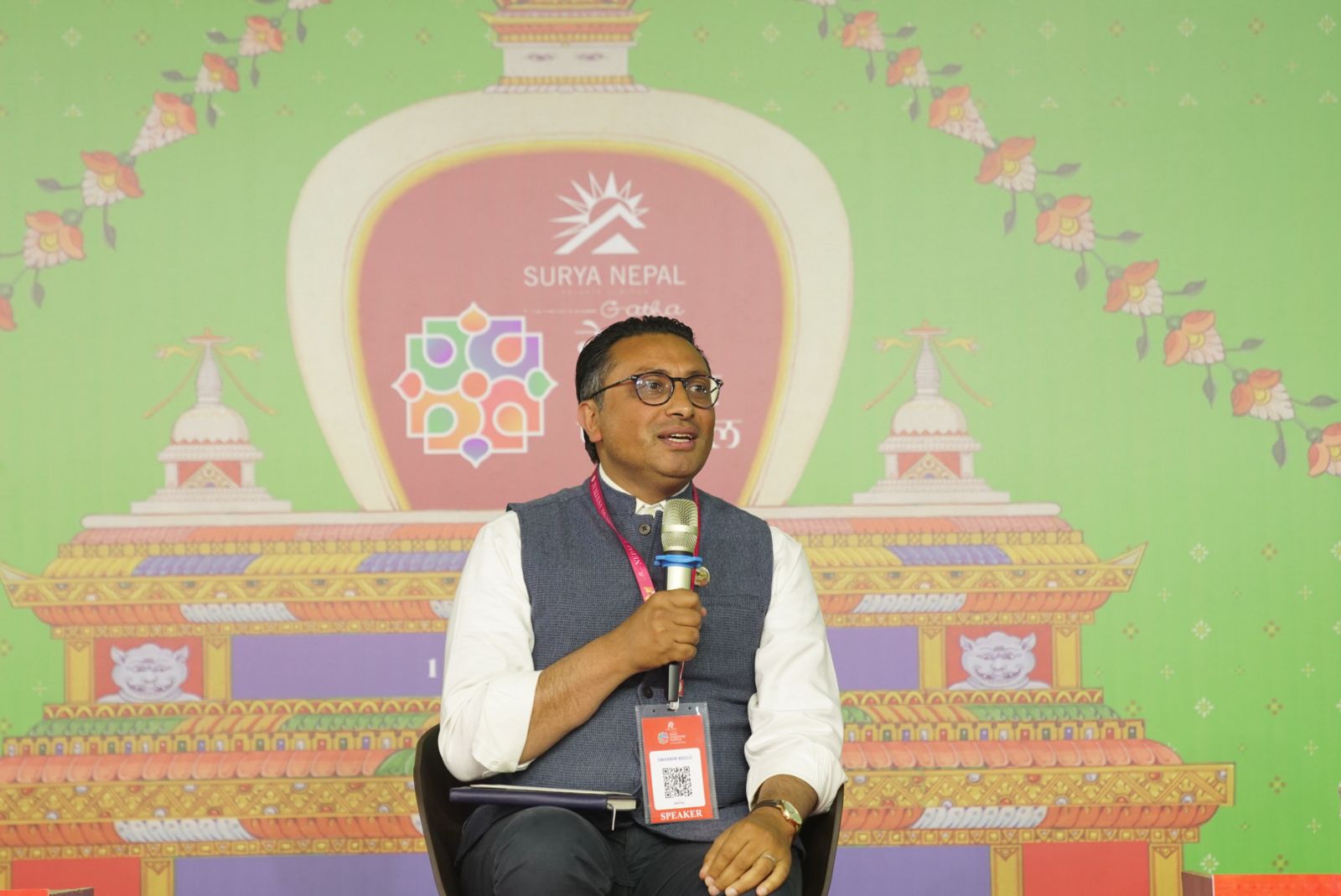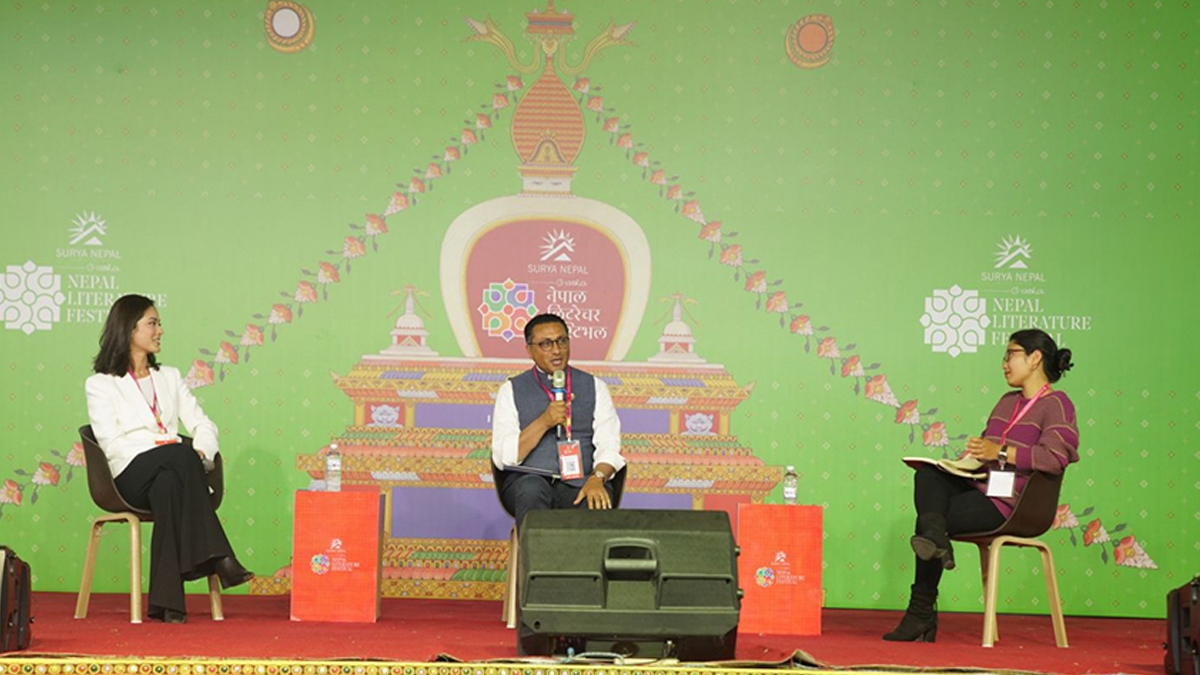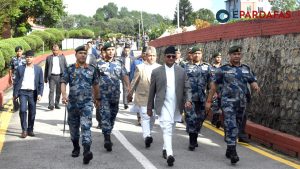
What’s Next for Nepali Youth Returning from Abroad?
The number of youth migration is increasing every year. It is estimated that 3000 Nepali youths leave on a daily basis. In the statistics of the last year, the number of people who migrated not only to Gulf countries but also to European and other destinations is also on the rise. Discontent among the youth is increasing because they do not see a future in the country. The question arises: What should be done if the young people who have migrated decide to return to the country? On the second day of the Surya Nepal Gatha Nepal Literature Festival, there was a debate on this topic.
Swarnim Wagle and Srinkhala Khatiwada were the speakers in the debate entitled ‘Brain Gain: What to do with the return?’ and the moderator was Sonia Awale.

Swarnim Wagle, who was elected as an MP from the Rashtriya Swatantra Party (RSP) and also serves as the Vice President of RSP, mentioned that the tradition of Nepalese migrating abroad for employment has been longstanding. He stated that the nature of seeking work abroad has evolved, noting, “The traditional patterns of Nepalese seeking employment opportunities, joining the Army, or migrating to Muglan have transformed in the 21st century due to globalization, which has intensified the movement of labor and capital.”
Shrinkhala, the former Miss Nepal, asserts that as the demand for skilled manpower in developed countries has increased over time, Nepali people have seized the opportunity effectively. She stated that Nepalis who recognize these opportunities have capitalized on the flexibility offered by developed countries. “The evolving dynamics have created a significant role for foreign youth, resulting in a shortage of workers and a demand for diverse skills. Consequently, doors were opened. Nepalis observed this trend, and thereafter, they began to emigrate,” she explained.
What strategies are needed to repatriate Nepalis who sought opportunities abroad? She suggests that repatriating Nepalis facing compulsion or necessity isn’t problematic. However, there’s uncertainty about retaining them in Nepal upon their return.

“People leave Nepal due to dire circumstances and compelling needs, often migrating to Gulf countries. Bringing them back isn’t the challenge; rather, the question is how to ensure their sustained presence in Nepal after their return,” she emphasized.
There’s another category: those who leave Nepal not out of necessity but seeking better opportunities or financial obligations. She believes the real challenge lies in halting or repatriating this group, which seeks novel creative avenues elsewhere.
“With increased skills, they seek jobs that match their qualifications, yet they also seek stability for their children and future. They leave Nepal in search of superior opportunities. Convincing them to return is exceedingly challenging,” she remarked.
Swarnim Wagle believes that the global citizen concept is important for addressing all these problems. He believes that the investment environment in Nepal should be made easier for Nepalis who have become private businessmen or investors working abroad.
“If we can embrace the concept of global citizenship, acknowledging that even if we leave Nepal, we remain Nepalese, it would greatly benefit us.”
Shrinkhala emphasizes the necessity of creating employment opportunities within the country for youth who are migrating abroad in search of financial security. She advocates for strengthening the private sector instead of relying solely on government mechanisms for job creation. Shrinkhala believes that a robust private sector can generate employment opportunities, thereby curbing the trend of youth migration.
“The private sector has contracted, and it urgently requires support. This is crucial for attracting young talent,” she asserts.
Having earned her master’s degree from Harvard University, Shrinkhala chose to return to Nepal, citing promising opportunities within her home country.
“I returned to Nepal because I saw potential here, rather than seeking opportunities abroad. Having reached a certain level in Nepal, I aspire to make a global impact. Using Nepal as a launch pad seemed like the most strategic and valuable opportunity,” she explains.
Shrinkhala attributes her decision to return to Nepal to the admiration she garnered from the country’s youth. She recognizes the importance of setting a positive example for them, stating that failing to return after gaining prominence could lead to disillusionment among the younger generation.
Swarnim is an individual who returned to Nepal after spending 20 years working abroad. Swarnim claims that leaders, including Ramsharan Mahat, pressured him to return to Nepal. Armed with a master’s degree in economics, Swarnim returned and assumed consulting roles in various organizations.
“Starting from my advisory role, I envisioned transitioning into executive positions or even entering politics. Now, having been elected as an MP by the people, I am ready to serve,” he stated.













Comments